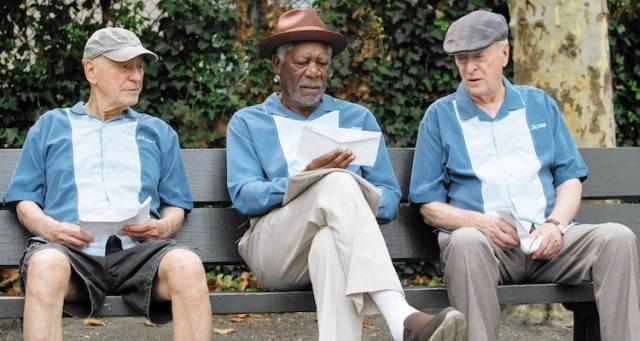
What kind of lazy, lowest-common-denominator movie is “Going in Style”? The kind where the one F-word in the script is delivered gratuitously by an old lady who has no other lines, and it’s supposed to be hilarious because she’s an old lady. An old lady who says the F-word! Why, next thing you know she’ll be rapping!
Mind you, it’s also the kind of hacky, ill-conceived sitcom where three old men decide to get back at the big banks that ruined this country (and, more to the point, their own pensions) by robbing one, and where the movie believes they are perfectly justified in this and should face no consequences. Indeed, the movie goes so far as to have a witness to the robbery perjure herself because she believes in the righteousness of the men’s actions.
But don’t worry. It’s also the kind of easy, first-draft movie where the diner waitress says to the elderly patrons, “Always eat your pie. Life is short,” to which Alan Arkin replies, “Thanks for the reminder!!” And where the old men see an even older, more senile old man, and one of them says, “If I ever get that bad — SHOOT ME!!” Not only is that incongruously mean — there’s no reason the other retirees would be so callous toward this poor fellow, who’s a friend of theirs — it’s not funny. That’s your best line? “If I ever get that bad — SHOOT ME!!”? This isn’t improv, you know. You don’t have to go with the first thing that comes to mind.
(To make matters worse, the Alzheimer’s patient is played by Christopher Lloyd. It’s the saddest, most humiliating role of his career, and he was in “Baby Geniuses.”)
“Going in Style” is a remake of a gentle, little-remembered 1979 film that starred George Burns, Art Carney, and Lee Strasburg. The new one has Michael Caine, Morgan Freeman, and Alan Arkin; was written by Theodore Melfi (who wrote and directed “Hidden Figures,” a film that is notable for not being terrible); and directed by Zach Braff — who, between this and his previous film, “Wish I Was Here,” has proven to be so unfamiliar with the basic operations of society and human interaction that you’d think he was an extra-terrestrial. Apart from the central premise, the only thing this version of “Going in Style” has in common with the original is that they both won’t be playing in theaters a month from now.
Joe (Caine), Willie (Freeman), and Al (Arkin) are retired Brooklyn factory workers on tight pensions. Joe is about to lose his house to a mean bank. Willie and Al live together, and Willie wishes he could afford to visit family more often. (He also needs a kidney transplant, to name one of a dozen or so plot threads that the film starts but isn’t interested in.) When their pension checks stop coming, the three visit the old factory to find out what’s up, conveniently doing so on the very day that the company gathers the employees — and former employees, whoever happens to be there — to tell them the factory is closing and all the pensions are gone. Moreover, the pensions are being “handled” by the very bank that has been tormenting Joe. Having witnessed a robbery at that same bank and noticing how easy it seemed to be, Joe proposes that he, Willie, and Al try it themselves.
Let me tell you some more about what kind of imbecilic poop for dummies this is. To practice for the robbery, the three oldsters shoplift from a grocery store. Mind you, they do not go to the register and demand the cash, which actually would be good practice for a bank robbery. No, they sneak around the store and stuff food in their clothes. Is this how they think banks work? That the money is just out on shelves for customers to take? They get caught shoplifting, of course, because they’re morons, and then there’s a painful slow-speed chase on a motorized scooter during which Willie deploys a bag of flour at the security guard in pursuit.
They finally get pointers from a real criminal (John Ortiz) who is referred to them by Joe’s lowlife ex-son-in-law (Peter Serafinowicz), who has not been a good father to Joe’s granddaughter (Joey King). But never mind, that’s another one of those underdeveloped extra threads. (See also: Al’s romance with Ann-Margret; Willie’s absent family; a scene where the three have to smoke pot but then don’t do anything funny; etc.)
The plot (which is not the same as in the 1979 film) reads like a dark comedy or a crime caper, genres where it’s palatable for likable characters to get away with major felonies while the FBI agent (Matt Dillon) who’s just doing his job is made out to be a schmuck. But Braff plays it as a sappy, straightforward comedy, the kind where everybody hugs at the end. And if you’re ever not sure how Braff wants you to feel, wait a second and Rob Simonsen’s simpering, obtrusive musical score will tell you.
I have one good thing to say about this clumsy, charmless, disposable turd: despite being a comedy about elderly men, it has no Viagra jokes. In fact, when Alan Arkin and Ann-Margret are about to hook up, and you think, “Uh-oh, here we go with the jokes about shortness of breath and creaking joints,” Braff cuts straight to the afterglow, sparing us whatever broad, embarrassing farce the sex scene might have been. Let’s be grateful for small mercies.
D+ (1 hr., 36 min.; )





